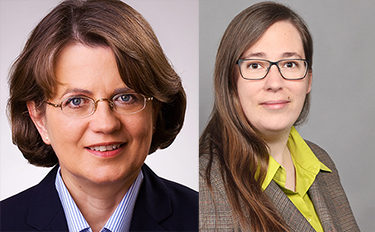
Gertrud Pickhan and Alina Bothe
(Pickhan, left, and Bothe)
USC Shoah Foundation has chosen its 2015 Teaching Fellows: Gertrud Pickhan and Alina Bothe, who will develop a seminar course as well as a public exhibition on the deportation of Polish Jews from Berlin at Freie Universität.
Teaching Fellows receive a $2,000 stipend and $500 for course materials, and work with USC Shoah Foundation staff to develop their course. Their syllabi are published on the USC Shoah Foundation website, and fellows are expected to give a public presentation of their course at the end of the fellowship period.
Both Pickhan and Bothe are longtime users of the Visual History Archive; Pickhan was one of the first professors at Freie Universität to begin incorporating testimony after FU became the first full access site in Europe in 2006, and Bothe is finishing her PhD thesis on the Visual History Archive and how digitization shapes the ways in which we research, write and perceive the history of the Holocaust.
Their graduate seminar course, which Pickhan and Bothe have taught once before, is called “Expelled! Researching the Deportation of Polish Jews from Berlin in 1938.” The course uses the Visual History Archive to research the fates of specific families who were affected by the Berlin Polenaktion, Oct. 27-30, 1938. On these days, between 1,500 and 6,000 people of Polish descent were expelled from Berlin to Poland.
Research of the Polenaktion in Berlin had never been done before, Bothe and Pickhan said. Their students last year were able to contact survivors or relatives from six families and are still in constant dialogue with them. The students were also inspired to dedicate Stolpersteine, memorial stones laid in pavement outside Holocaust victims’ former homes or businesses, to more than 25 people they had researched.
Bothe and Pickhan were inspired by their students’ achievements and research results, so they decided to apply for the USC Shoah Foundation Teaching Fellowship in order to teach the course three more times in the upcoming years. They intend to research a total of 50 families affected by the Polenaktion.
They are also working with former students on a public exhibition in Berlin, planned for October 2017, which will focus on the life stories of Polenaktion victims and survivors. The exhibition will be developed with four partners, among them the Aktives Museum Berlin and the Fundacja Tres, a Polish foundation commemorating the Polenaktion in the town of Zbaszyn, where about 9,000 people were deported. The exhibition will combine physical and virtual components, including a database of families affected by Polenaktion and testimonies from the Visual History Archive. There may also be an app with guided walking tours to historical sites in Berlin and QR codes placed around the city for more information.
The instructors said that although they are both experienced working with the Visual History Archive, working with the ever-expanding collection of testimonies is still a huge undertaking. They are looking forward to collaborating with USC Shah Foundation staff during their fellowship.
“Being in collaborative exchange can only deepen our understanding of the archive and improve our teaching,” Bothe and Pickhan said. “Furthermore we hope to develop ideas together, how testimonies could be included in the planned exhibition.”
Bothe and Pickhan said the testimonies allow students to have a personal connection to history, and teach them about the Holocaust in great detail. But it is also important that they learn to use the testimonies along with other sources.
“We have to enable students to work responsibly with testimonies and bring the individual memories, as they were taped, into dialogue with other sources from different archives,” they said. “Our students could learn in great detail about the pre-war lives of the families in Berlin as well as about the persecution of each family and their members. But we also teach them to use further materials to be able to write a broader history of each family.”